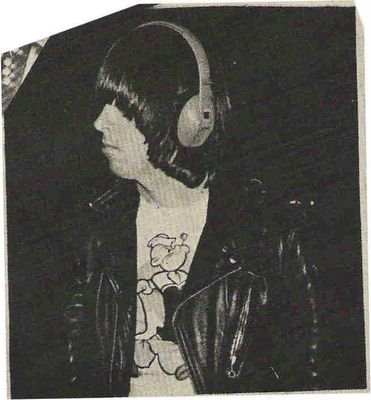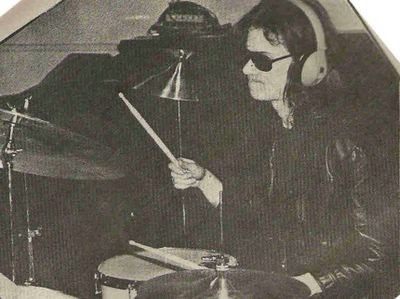This is really more
Dave's sort of thing, but I read it this morning and got all pissed off.
Known as "Prussian Blue" — a nod to their German heritage and bright blue eyes — the girls from Bakersfield, Calif., have been performing songs about white nationalism before all-white crowds since they were nine.
"We're proud of being white, we want to keep being white," said Lynx. "We want our people to stay white … we don't want to just be, you know, a big muddle. We just want to preserve our race."

The Goebbels, err, Gaede Twins. 
Lynx and Lamb have been nurtured on racist beliefs since birth by their mother April. "They need to have the background to understand why certain things are happening," said April, a stay-at-home mom who no longer lives with the twins' father. "I'm going to give them, give them my opinion just like any, any parent would."
April home-schools the girls, teaching them her own unique perspective on everything from current to historical events. In addition, April's father surrounds the family with symbols of his beliefs — specifically the Nazi swastika. It appears on his belt buckle, on the side of his pick-up truck and he's even registered it as his cattle brand with the Bureau of Livestock Identification.
"Because it's provocative," explains April of the cattle brand, "to him he thinks it's important as a symbol of freedom of speech that he can use it as his cattle brand."
See. I know us liberals are supposed to be wacky moral relativists and all that, but if you can't get behind the whole "Don't Raise Your Kids as Nazi Propaganda" thing, I think there's a problem. Most people, with the exception of Pat Buchanan, have no trouble with the "Hitler was a bad man" meme.
Like many children across the country, Lamb and Lynx decided to help the victims of Hurricane Katrina — the white ones.
The girls' donations were handed out by a White Nationalist organization who also left a pamphlet promoting their group and beliefs — some of the intended recipients were more than a little displeased.
After a day of trying, the supplies ended up with few takers, dumped at a local shop that sells Confederate memorabilia.
Last month, the girls were scheduled to perform at the local county fair in their hometown. But when some people in the community protested, Prussian Blue was removed from the line-up.
But even before that, April had decided that Bakersfield was not "white" enough, so she sold her home, and hopes that she and the girls can find an all-white community in the Pacific Northwest.
Do all parents share their values with their kids? Sure. But most parents also make sure their kids have a way to judge those values. That's where things like going to school come in handy, and allowing your kids access to a world outside yours. My teen is into all kinds of stuff I don't really "get," and you know what? That's all right.
Guess we just have to sit back and wait for their Jamiel Terry moment.
More at
NTodd's, including lyrics.
UPDATE: Just got back from a listen to "Skinhead Boy."
Oi, oi, oi, skinhead boy, you're my oi boy.
Skinhead boy, skinhead man
Someday you will save our land.(Bangs head on desk.)
On the plus side, this is pretty amateurish, just these two and an acoustic guitar, easily transportable to a rally in an Idaho cornfield, say. And it's, errr, not good. There's not even any harmonies, just these two singing in unison.
But then it was never really about the production value, now, was it?
And ANOTHER UPDATE:
This post was linked to from
Steve Gilliard (who does a lovely photoshop job on the girls), where commenter "Magnum" notes the following: "I just found out that Prussian Blue isn't 'a nod to their German heritage and bright blue eyes'. It's a bright blue chemical residue that's left behind in areas that Zyklon B has been used."
And
the link:
Holocaust deniers often claim that the so-called forensic reports of Leuchter, Rudolf and others prove the impossibility of homicidal gassings at Auschwitz and Birkenau. A central point of their argument is that their studies apparently show that delousing chambers, in which Zyklon B was used, have much higher concentrations of cyanide compounds present than do the homicidal gas chambers. Of course such presumes that their studies were conducted honestly and with good technique. Zimmerman,1Pressac,2and perhaps others have shown that such a presumption is unwarranted. Even if one takes the reports of Leuchter and others at face value, however, there is a crucial problem with their studies that is addressed in the study of the IFFR. This problem centers around a class of compounds called the iron blues, a representative example of which is Prussian blue.
Hydrogen cyanide and most of its salts are readily soluble in water and thus extremely susceptible to weathering, Prussian blue on the other hand is extremely insoluble. If Prussian blue were to form in a building exposed to hydrogen cyanide, it would remain present at high concentration while other compounds of cyanide would gradually weather away. It has long been known that some of the delousing chambers exhibit obvious blue staining, whereas the remains of the homicidal chambers at Auschwitz and Birkenau do not. Comparing the cyanide content of material from the delousing chambers that exhibits this blue staining and material from homicidal chambers that do not exhibit this staining, may show that the blue staining is indeed a cyanide compound, but it does not show the homicidal gas chambers were not exposed to HCN. This issue is explored in some depth in several articles available at the website of the Holocaust History Project (THHP).3 Here I only summarize those findings and explain their implications for the IFFR study.
It is shown in great detail in the above-mentioned articles that the conditions in the gas chamber would have made the formation of Prussian blue in significant quantities improbable. A building in which Prussian blue formed would have much higher levels of detectable total cyanides than a building in which Prussian blue did not form. Recall the Prussian blue is much less susceptible to weathering than other cyanides; so it is no surprise if buildings with blue staining have more cyanides than those without.
What is the right experiment to do? Detecting total cyanides appears to be a probe for the likelihood of Prussian blue formation and not a probe for exposure to cyanide. The correct procedure is to use a method of detecting cyanides that discriminates against the detection of Prussian blue. If any cyanides other than Prussian blue have survived the weathering process, they will be present in small concentrations. They need to be detected with an extremely sensitive technique.
And here I thought it was impossible for me to feel any nastier about these young women than I already did.















